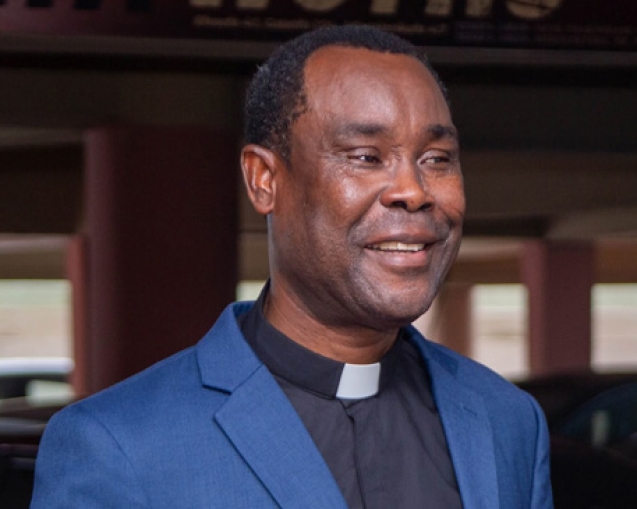Thanks to the leadership of The Church of Pentecost led by The Chairman, Apostle Eric Nyamekye, for the 2022 year’s theme titled “Equipping the Church as an army to possess the nations.” I believe the Spirit-filled presentations on the theme have blessed the entire Christian fraternity. The body of Christ has also been awakened as never before to rediscover its purpose to the nations. Unlike bloody military campaigns in taking over enemy territories, the “Possessing the Nations” agenda has been well understood as the taking over of our society for Christ and subduing them with values and principles of the Kingdom of God. The Bible refers to Satan as the Prince of this world. Any attempt, therefore, to infiltrate the Sin-infested societal settings with Kingdom values is always met with fierce resistance from him. Jesus said in Matthew 12:29, “…how can anyone enter a strong man’s house and carry off his possessions unless he first ties up the strong man? Then he can plunder his house.” Possessing the nations is an end-time battle cry reminiscent of Israel’s conquest of the nations who, at the time, had embraced all manner of practices contrary to the Kingdom principles.
Indeed, everything about Israel’s military campaigns during the Old Testament period was a shadow of the real spiritual warfare associated with the Christian pilgrimage. However, the New Testament’s prescribed mode of engaging the enemy of the Church is spiritual, even though the battle objectives are similar. Accepting Jesus as the Lord of one’s life is what automatically enrols them as foes of Satan. Christians are, therefore, fighters from the day Christ is invited into their hearts until they join their maker. 2 Corinthians 10:3-4 reads, “For though we live in the world, we do not wage war as the world does. The weapons we fight with are not the weapons of the world. On the contrary, they have divine power to demolish strongholds.”
Fighting is primarily taking part in a violent struggle involving the exchange of physical blows or the use of weapons. The word “Fight” naturally sends shivers down the spine of everyone, no matter the opponent’s size, duration and strength. About Christian warfare, Apostle Paul, however, introduces the phrase “Good fight” in I Timothy 6:12a when he said, “Fight the good fight of the faith…”
Fighting can, therefore, be said to be a good one if and only if victory over the opponent is assured. One would expect that parties engaged in a fight would be well-armed and prepared if victory is the goal. Beyond preparation and ammunition, areas that need attention are the Command structure and the positioning of the troops. The battle strategy and the exhibition of professionalism are as vital as the ammunition used for any military operation. Clear orders from the Commander-in-Chief and concise instructions from Commanders are the essential pointers that crystalize the success of military operations besides the ammunition and strategies adopted on the battlefield. Although believers in warfare against the devil are victory-bound, certain actions and inactions by some result in needless casualties on the side of the Church. Using Uriah the Hittite as a case study, the article highlights the roles major functionaries in Christian warfare must play to achieve victory, thereby making the fight with the devil a mere formality in this part of eternity.
In the Spring of 997BCE, Israel mounted a military campaign against the Ammonites. David, their King and Commander-in-Chief and a celebrated fighter from his youthful days chose to remain in Jerusalem even though it was the time Kings went to war. Joab was the commanding officer for that operation. While taking a stroll on his upper terrace, David chanced upon the wife of Uriah, who was bathing. He sent for her, eventually had an affair, and got her pregnant. Sensing danger, David recalled Uriah from the battlefield to come home and spend some time with his wife so the responsibility of the pregnancy could easily be shifted to him. Tried as he did, Uriah respectfully insisted on abstaining from seeing his wife. At one instant, David got him drunk to blur his sense of judgment and soften the tough stance he had taken not to visit home. Even in his drunken state, Uriah wouldn’t badge but kept his ethics standards as a zealous soldier of God’s army. He replied to the King, “The ark and Israel and Judah are staying in tents, and my commander Joab and my Lord’s men are camped in the open country. How could I go to my house to eat and drink and make love to my wife? As surely as you live, I will not do such a thing!” (2 Samuel 11:11). Uriah’s spiritual consciousness and morale as a fighter for God had reached a crescendo, and no amount of alcoholic toxins or human power would stop him. Uriah has proved that an awakened and equipped soldier of the Cross will defy all odds to lift the banner of Christ high until victory is attained. David then commanded Joab in a letter sent through Uriah to position the latter at the battle’s fiercest and most challenging corner and withdraw every support from him so he will be killed. What the King did also shows that once a heart is determined to sin, the conscience is rendered numb until it is relegated to total hibernation. If not so, how didn’t Uriah’s vehement refusal to take a nap at home and his reason for the same prick David’s conscience? At least, the mere mention of the Ark and Israel should have prevented David from further reducing Israel’s fighting men with Uriah’s assassination. Therefore, Uriah’s death sentence by David amounted to sabotaging the very army he was superintending.
Out of misguided loyalty, Commander Joab obeyed his Commander-in-Chief’s orders and positioned Uriah at the fiercest zone of the battle. David’s letter to Joab read, “Put Uriah out in front where the fighting is fiercest. Then withdraw from him so he will be struck down and die.” (2 Samuel 11:15). On that fateful day, Uriah was assigned a particular station to do combat for the Lord’s army. He happily took up the challenge because the zeal of the Lord had lifted his morale so high. As the battle at his stationed joint was getting difficult, Joab clandestinely withdrew all the needed support until the sword of the Ammonites killed Uriah. The cause of Uriah’s death was not the sophisticated military strategy of the Ammonites but the carefully planned withdrawal of the support he needed at the very station under David and Joab’s control. Uriah was, in essence, killed by a blow from his own camp and no mere personality but his Commander-in-Chief. Soon after he fell on the battlefield, God was displeased and sent Prophet Nathan to David, saying, “Why did you despise the word of the LORD by doing what is evil in his eyes? You struck down Uriah the Hittite with the sword and took his wife as your own. You killed him with the sword of the Ammonites.” (2 Samuel 12:9). It is worth noting that Uriah was not the only one who died at his assigned station.
Some other Israeli soldiers perished with him, thereby increasing the casualties in their camp needlessly. Joab may excuse himself for condoning and perpetrating that crime due to the command structures in military operations. However, it must never be forgotten that God was actually the Commander-in-Chief in all of Israel’s combats or, in essence, the battles we fight as believers. Orders received from His human representatives on the field must be subservient to those from God. The “Davids” are those who God has placed in strategic leadership positions within the family, marketplace or Church setting for the advancement of the Kingdom business. When God sent Nathan to David, He reminded him of his lowly estate from his childhood past and how He had elevated him to be Israel’s King. God expects all He lifts to be guided and measured, so their attitude doesn’t negate all the gains expected of them in His vineyard business.
Unfortunately, some allow power and the authority they wield to take the better part of them. The same power God has offered you to bring hope to many is the same authority capable of sending others into the abyss of hopelessness. Excess power always comes with extra luggage. Just a stroke of a pen by the hand of King David was enough to dispatch Uriah the Hittite to join his ancestors before his time. Indeed, the reverent fear associated with authority prevented Uriah from opening the letter describing the mode of his assassination but turned him into the reliable courier of his death sentence. Power is sweet, but let us be careful with the little power we wield today. Jesus used His power to serve and not swerve His constituents during His earthly stay. After his affair with Bathsheba, David had to use his authority to eliminate Uriah because he had difficulty covering up his shame. The selfish use of the little power God gives us tends to sabotage and derail the objectives of His Kingdom business. Even though Uriah was David’s target, many more soldiers fighting for the Lord perished with Uriah, per the messenger’s account to David. As believers, our acts of wickedness against our neighbours affect many more people than one can estimate.
It was, therefore, not surprising the unimaginable price David had to pay for that callous act from that day until he joined his maker. Although God forgave him, the consequences of that one-night stand with Uriah’s wife in his household, Kingdom and confidence as a man after God’s own heart were just unbearable.
The “Joabs” of our time are those who conspire and condone callous acts against colleague soldiers of the Cross on the battlefield. Under the guise of showing loyalty to those in authority, they perpetrate all crimes and throw their Spirit-inspired convictions to the dogs. When Joab realized the only news that would get his boss excited was the gruesome murder of Uriah, his colleague soldier, he positioned him in a corner and withdrew all his helpers from him. Some of the support systems we deprive our colleagues of are but are not limited to logistics, Human Resources, financial resources, Listening ear, encouraging words, intercessory prayers, godly counsel and mentoring regimes, love and kindness. The Bible didn’t say Uriah fell that day because he fought bare-chested or footed, and the Scriptures also didn’t blame Uriah for fighting without his helmet. Uriah suffered due to the withdrawal of the needed support at his corner.
Similarly, putting on the whole armour of God, as spelt out in Ephesians 6:11-18 is a non-negotiable starter as a soldier in the Lord’s end-time army. However, denying colleague combatants the needed support set them up for failure or defeat irrespective of their helmets, belts, boots, shields and swords in their hands. The believers’ full armoury is for their preparation, while their needed support on the battlefield becomes the vehicle from which the missiles can be launched against enemy targets. It was, therefore, not the corner or position Joab placed Uriah that killed him. Uriah started dying when Joab began withdrawing support from him when he needed it most.
The least we can do for each other on the battlefield as we take over the nations is to be that reliable shoulder upon which tired hands can have rest. Unfortunately, while many are equipping the saints, others are busily de-equipping some, endangering them on the battlefield. Joab thought he was putting a smile on David’s face by killing Uriah, but little did he know that he was actually setting the premise for his own destruction by the same David in his last words to Solomon, his son, before giving up the ghost. Concerning Joab, David instructed Solomon, “Deal with him according to your wisdom, but do not let his grey head go down to the grave in peace.” (1 Kings 2:6). So, Benaiah killed and buried him under Solomon’s instruction in verse 34. The “Joabs” must, therefore, learn that if they condone the “Davids” callous acts against their colleagues on the battlefield, they will fall by similar directives even if their “Davids” are out of the scene.
Uriah refused to go home to keep his focus and concentration on the battlefield as an army fighting the Lord’s battle. That kind of posturing comes with many sacrifices, which are seen and appreciated by God alone. The “Uriahs” are the focused believers who have allowed themselves to be consumed with the battle objectives in the Lord’s vineyard business until every foe is vanquished. Like Uriah, they put on the altar their comfort, peace, convenience, safety, health, pleasure, possessions, family life, children, spouses, livelihoods and lives as and when they interrupt the “possessing the nations” agenda. The world sees them as slow, timid or unwise chaps who have lost all their taste buds and appetite for good things. On the battlefield, they are, however, a perfect description of Romans 12:1, which reads, “Therefore, I urge you, brothers and sisters, in view of God’s mercy, to offer your bodies as a living sacrifice, holy and pleasing to God—this is your true and proper worship.”
If you happen to be a “Uriah” placed in a tight corner with dwindling support from supervisors and colleagues by the day, don’t curse the day you accepted to enrol in the Lord’s end-time army. Wait a minute! You are never a mistake on the battlefield. Jesus said, “Whoever finds his life will lose it. And whoever loses his life for My sake will find it.” (Matthew 10:39). Don’t also blame yourself for heeding instructions from your field commanders, including the difficult position assigned to you. I have heard the argument as to why God did not miraculously save Uriah from dying to shame David and Joab. I believe God allowed that to be a lesson for those doing the actual combat operations in our New Testament dispensation. Instead of spending precious time on such needless debates, let’s use the time to reflect on how we can offer to help those in dire need of them when the going gets tough. 1 Corinthians 10:11 says, “These things happened to them as examples and were written down as warnings for us, on whom the culmination of the ages has come.”
One good lesson for all “Uriahs” is to be observant and pick the early signals anytime some “Davids” begin to behave funny by being overly concerned about their plight. If Uriah asked himself why King David was doing whatever was within his means to get him to go home and spend time with his wife, even to the extent of getting him drunk, the story might have ended differently. It is not bad for superiors or colleagues to be nice and show concern about us. However, staying vigilant with the help of the Holy Spirit is what will help discern the real motives of such superficial kindness. In military parlance, a strategic battle position is a position from which you can fight and use the tactics that suit advancing your strategic interest. In his book titled “The Art of War”, Sun Tzu said, “The skilful fighter puts himself into a position which makes defeat impossible, and does not miss the moment for defeating the enemy.” When Uriah realized the strange withdrawal of some of his best fighting men from the corner they were fighting, he should probably have acted quick to avert that pending danger. So, the “Uriahs” must take careful notice anytime they see the withdrawal or gradual erosion of all support systems at their disposal. They must act fast and wisely by moving to safe arenas as much as practicable and living the rest under God’s care.
Waiting upon the Lord in prayer would also be helpful in such times. In Acts 23:12-24, Apostle Paul’s nephew and the army commander were those through whom God offered a helping hand and rescued him from the hands of his assassins. Similarly, fasting and prayers led by Esther and Mordecai are what uncovered Haman’s secret plan to annihilate all the Jews throughout the Persian empire in a single day. I am not attacking Uriah’s prayer life by any stretch of the imagination. It is the lessons for our time as soldiers of the Cross I am interested we all glean. After all, when our work is done, we will all join our maker, but not until then, we must fight on as soldiers equipped and possess every territory the Lord expects us to take.
If Uriah’s name is featured in Jesus’ genealogy in Matthew 1:6 and we are still discussing him today, then, though difficult, he fought a good fight. Even if the needed support systems are withdrawn for your disgrace through the “Joabs”, fight on because the fight to possess the nations is a good fight worthy of sacrificing everything for. Your labour in the Lord is never going to be in vain. Romans 8:18 reads, “I consider that our present sufferings are not worth comparing with the glory that will be revealed in us.” Stay blessed, and fight on!
Written by Pastor James Agyin


















